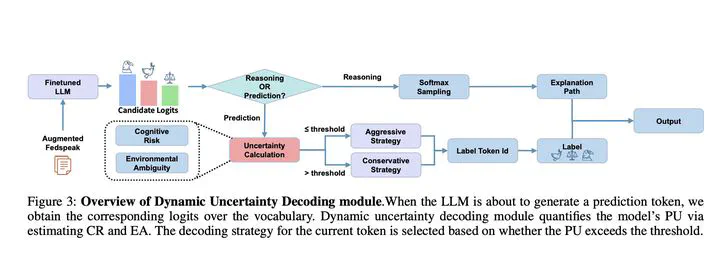Interpreting Fedspeak with Confidence: A LLM-Based Uncertainty-Aware Framework
Aug 12, 2025·,, ,,,·
1 min read
,,,·
1 min read
Rui Yao
Qi Chai
Jinhai Yao
Siyuan LI
Junhao Chen
Qi Zhang
Hao Wang
 Fedspeak Analysis Framework
Fedspeak Analysis FrameworkAbstract
“Fedspeak”, the stylized and often nuanced language used by the U.S. Federal Reserve, encodes implicit policy signals and strategic stances. The Federal Open Market Committee strategically employs Fedspeak as a communication tool to shape market expectations and influence both domestic and global economic conditions. As such, automatically parsing and interpreting Fedspeak presents a high-impact challenge, with significant implications for financial forecasting, algorithmic trading, and data-driven policy analysis. In this paper, we propose an LLM-based, uncertainty-aware framework for deciphering Fedspeak and classifying its underlying monetary policy stance. Technically, to enrich the semantic and contextual representation of Fedspeak texts, we incorporate domain-specific reasoning grounded in the monetary policy transmission mechanism. We further introduce a dynamic uncertainty decoding module to assess the confidence of model predictions, thereby enhancing both classification accuracy and model reliability. Experimental results demonstrate that our framework achieves state-of-the-art performance on the policy stance analysis task.
Type
Publication
In arXiv preprint
Abstract
This paper proposes an LLM-based uncertainty-aware framework for interpreting Federal Reserve communications (Fedspeak) and classifying monetary policy stance. The framework incorporates domain-specific reasoning grounded in monetary policy transmission mechanisms and introduces dynamic uncertainty decoding to assess prediction confidence.
Methodology
- Domain Knowledge Integration: Incorporates monetary policy transmission mechanism knowledge
- Uncertainty Quantification: Decomposes perceptual uncertainty into cognitive risk and environmental ambiguity
- Dynamic Decoding: Adaptively selects decoding strategies based on model confidence levels
Results
The framework achieves competitive performance on policy stance analysis tasks, with uncertainty measures providing reliability indicators for predictions.